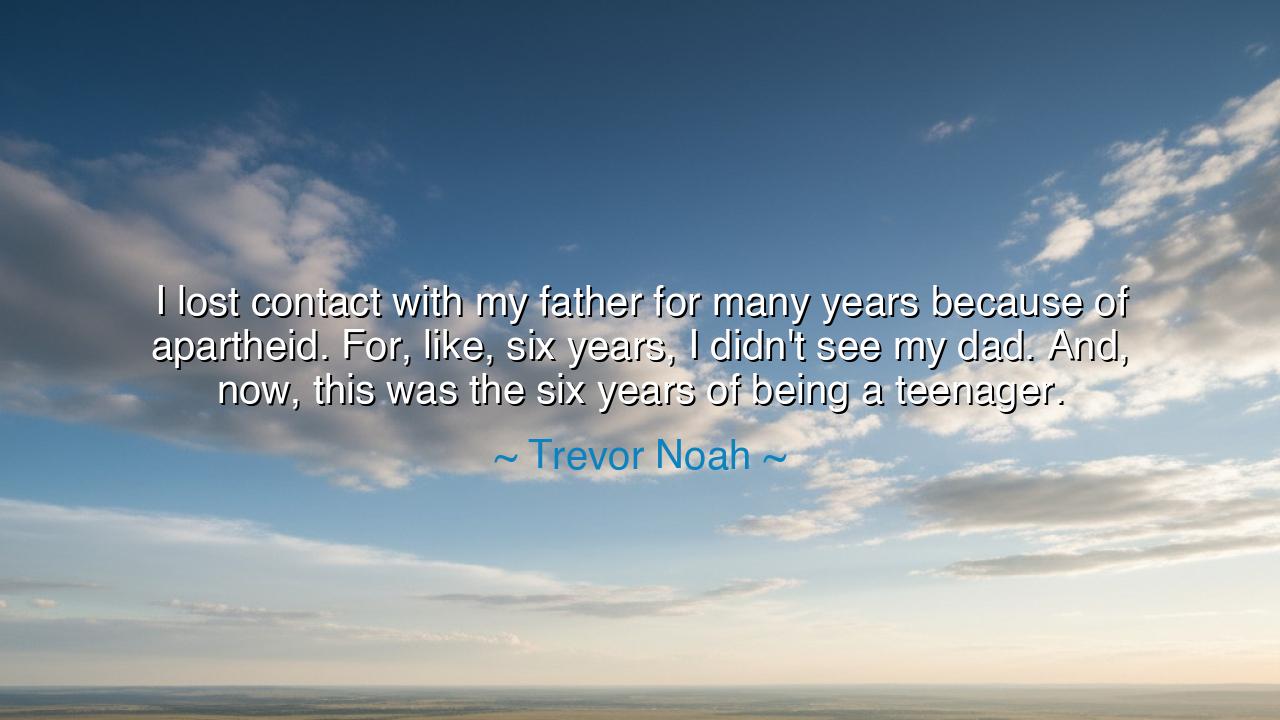
I lost contact with my father for many years because of
I lost contact with my father for many years because of apartheid. For, like, six years, I didn't see my dad. And, now, this was the six years of being a teenager.






Hearken, O children of history and resilience, and attend to the words of Trevor Noah: “I lost contact with my father for many years because of apartheid. For, like, six years, I didn't see my dad. And, now, this was the six years of being a teenager.” In these words lies a meditation upon separation, injustice, and the trials of youth under the weight of oppression. From the dawn of human society, the hearts of the young have often been tested by forces beyond their control—by the edicts of law, the cruelty of injustice, or the divisions wrought by fear and prejudice. Noah’s reflection reminds us that the pain of absence is magnified when it touches the formative years of adolescence, a season of growth, questioning, and discovery.
Consider the nature of enforced separation. To lose a parent during youth is to face a void in guidance, affection, and support. Yet the absence caused by apartheid—a system designed to divide, oppress, and control—adds another layer of injustice. The boy is not only bereft of familial presence; he is cast into a world structured to deny him connection, opportunity, and dignity. The six years of missing a father become a crucible, shaping resilience, understanding, and the eventual depth of empathy.
History offers poignant examples of such trials. Consider Nelson Mandela, who, as a young man, experienced displacement and separation under the oppressive structures of colonial and apartheid-era South Africa. Though estranged from certain family members and communities, he cultivated vision, courage, and the conviction to fight for justice. Like Noah, those years of enforced absence and challenge were formative, imprinting lessons of endurance, perspective, and moral insight that would echo through a lifetime.
Noah’s reflection also illuminates the intertwining of personal loss and systemic injustice. His teenage years, a period meant for guidance, learning, and exploration, were shadowed by a political system designed to fragment families and communities. Yet even in the harshest circumstances, the human spirit finds ways to adapt, to grow, and to absorb lessons that transcend immediate suffering. Adolescence, though marked by absence, becomes a teacher of resilience and self-reliance.
Moreover, this reflection emphasizes the enduring impact of familial connection. The memory and eventual reunion with his father become a testament to the strength of bonds across time and distance. Even when physical presence is denied, the influence of the parent—through stories, values, and eventual reconnection—shapes character, perspective, and understanding. Love, though interrupted, persists as a guiding force, resilient against the pressures of injustice and circumstance.
From this teaching emerges practical wisdom. Honor and preserve connections with family and mentors, even when circumstances are difficult. Recognize that absence, though painful, may cultivate strength, patience, and perspective. Seek to understand history and context, allowing the struggles of youth to inform empathy, resilience, and a commitment to justice. Even in hardship, the heart retains the capacity for love, reconciliation, and growth.
Let the generations remember this eternal truth: absence and adversity can forge resilience and insight. Trevor Noah’s words remind us that systemic injustice inflicts deep wounds, yet the spirit endures. The trials of youth, especially when shaped by oppression, may strengthen courage, deepen understanding, and nurture a resolve to heal and transform both personal and collective histories.
Therefore, O seeker of wisdom, embrace the lessons of separation, injustice, and absence. Honor the bonds of family and community, cultivate patience, and let resilience guide your steps. In the face of imposed division, allow love, memory, and moral conviction to endure, shaping a life that not only survives adversity but transforms it into insight, empathy, and enduring strength.






AAdministratorAdministrator
Welcome, honored guests. Please leave a comment, we will respond soon